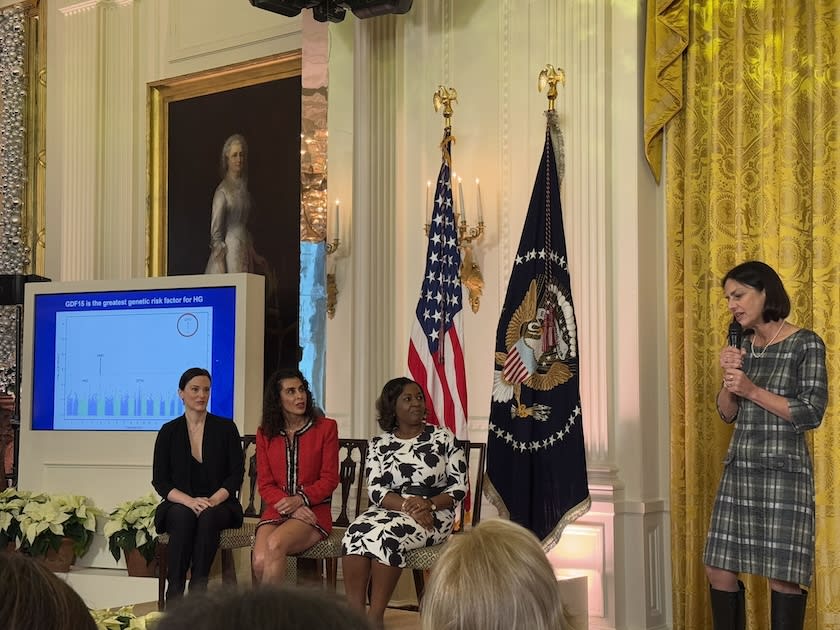The White House Conference on Women's Health Research: A step toward a healthier future for women
There are certain experiences that leave a mark on you. For me, one of these was attending the first-ever White House Conference on Women’s Health Research—a powerful gathering of researchers, innovators, and leaders united by a shared mission to confront longstanding gaps in women’s health. I was honored to join this incredible group, as we tackled women’s healthcare issues that have often been ignored, underfunded, or overlooked. But one thing became clear: Things are changing, and the future of women’s health is looking brighter than ever.
The importance of focused research on women’s health problems
For far too long, women were treated as “small men”; issues specifically tied to women's biology and life experiences have historically been sidelined in medical research. But the White House Conference on Women’s Health Research, led by First Lady Dr. Jill Biden, marked a defining step in shifting the narrative on medical care for women. We discussed conditions unique to women, like endometriosis and menopause; those that present differently in women than men, like heart disease; and those that disproportionately affect women, like Alzheimer’s.

A new era of research and innovation in healthcare for women
In the past, women’s gender-specific health conditions and pain have been dismissed as exaggerated, hysterical, or even just a normal part of being a woman. This disregard for women’s medical experiences has led to a lack of research, misdiagnoses, and inadequate care. But, as the healthcare industry shifts focus and increasingly invests in understanding women’s health problems and unique health needs, these realities are finally being acknowledged and addressed. Through continued research, awareness, and investment, we’re beginning to recognize the real and significant impact of these conditions on women’s lives.
We are entering a pivotal moment for advancing women’s health. While we’ve made significant progress, there’s still a lot of work ahead to close critical gaps in science and women's healthcare.

I’d like to highlight three women who spoke on these issues at the White House Conference on Women’s Health Research. Their presentations were not only insightful, but they left a lasting impression on me, illustrating the power of listening to and validating women’s health experiences.
The first is the geneticist Dr. Marlena Fejzo. Dr. Fejzo transformed her personal battle with hyperemesis gravidarum (HG)—a severe form of pregnancy-related nausea and vomiting—into a medical breakthrough. Through her research, Dr. Fejzo identified a genetic mutation that could predict the risk of hyperemesis gravidarum. This discovery offers a potential diagnostic tool to detect women at higher risk of HG early in their pregnancies, enabling better management of the condition. Her journey, from being misdiagnosed and dismissed to becoming a trailblazer in this field, underscores the importance of listening to women’s health concerns and advancing women’s health research that is often neglected.
Then there’s the entrepreneur Joanna Strober, the founder of Midi Health. She turned her months-long struggle with insomnia and brain fog into a catalyst for change. After finally receiving a menopause diagnosis, Strober became determined to help other women navigate similar midlife health challenges. She created an on-demand care model through Midi Health to address the complex needs women often face during this period of their lives. Her story is a powerful example of how lived experience can spark innovation and deliver impactful solutions for others.
Lastly, Dr. Jyoti Gupta, a researcher from GE HealthCare, highlighted the transformative potential of artificial intelligence and machine learning in uncovering hidden health insights. Her groundbreaking women’s health research identified arterial calcifications on mammograms as a marker for cardiovascular disease—a discovery that could revolutionize early detection and prevention strategies for women. This kind of technological advancement demonstrates how cutting-edge innovation is propelling women’s health into a new era.
These examples only scratch the surface of the transformative work being done to improve women’s health. The research underway is vast—and urgently needed. From exploring the impact of exercise during pregnancy to developing innovative care models for autoimmune diseases, to creating noninvasive diagnostics for endometriosis and improving treatment options, we are witnessing a snowball effect of progress in women’s healthcare that’s reshaping the future. This momentum is not just accelerating women’s health research, but it’s driving tangible improvements in medical care for women and outcomes for women everywhere. It’s a reason for optimism and hope.
The growing investment in women’s health innovation
What’s truly transformative about the advancements in women’s health is that it has evolved from a neglected, niche area of research to a central focus of innovation and progress. This shift is fueling critical breakthroughs and ensuring that women’s health is finally receiving the attention it has long deserved.
Venture capital and private equity firms have taken notice. As a result, there is a renewed sense of momentum in this sector. Women's health isn’t simply a matter of improving the lives of billions of people around the world. It’s become a critical driver of innovation to better address the unique challenges women face.

I’m proud of how far we’ve come in women’s health research. But the work doesn’t stop here. It’s up to us—as leaders, innovators, funders, and advocates—to keep pushing forward, ensuring that women’s health becomes a central focus in every corner of the healthcare landscape. Together, we’ll create a future where everyone’s needs are recognized and acted upon, intentionally. And it will have lasting impact on our daughters, nieces, friends, colleagues, and all other women for generations to come.
Join Press Ganey in reshaping the future of women’s healthcare. Our innovative solutions and specialized expertise empower organizations across the country to drive meaningful improvements in patient experience—and outcomes. Together, we can create lasting change. Reach out to our team to learn more.